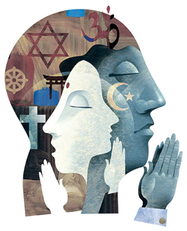
This incident, the culmination of the worst fears of the Jewish community, will have made Jews throughout the world very nervous and anxious. It’s the worst anti-semitic attack in America but such incidents are not confined to the States and there have been anti- Jewish terrorist attacks throughout Europe. Anti-semitism is one of the evils of our time.
It so happens that our local branch of the Council of Christians and Jews had a public event this week on anti-semitism. It’s a topic of public concern in Britain, principally because of the controversy over Jeremy Corbyn, the leader of the Labour Party, who is so very pro-Palestinian and not hard enough on the anti-semitism within his party. There is real consternation among Jews and the publicity around it has made many of them insecure about their future in Britain. About 40% of the community have confessed to considering emigration to Israel as the only surety of safety. 7,000 Jews went to Israel in 2015 after the French attacks.
At our meeting we heard how anti-semitic attacks were part and parcel of Jewish life and were often exacerbated after trouble between Israel and Palestine and how synagogues and Jewish events had to be strict on security. Jews feel under threat and one respondent to a consultation on Jews in Scotland admitted to not acknowledging her Jewishness on the census form because “ then they would know where to find me”. Anti-semitism is an evil, a sin and we Christians have to be aware of our past history in relation to the Jews and how that and our theology has contributed to it.
But in saying that, I think understanding and talking about anti-semitism can be difficult. Sometimes our way of expressing ourselves can be interpreted as anti-semitic but not necessarily so. It was suggested, for example, that ‘Christianity is all about supercessionism’ in that it sees itself as the fulfilment of Judaism – is this meant to suggest Christianity is inherently anti- semitic? Does calling the Hebrew scriptures the Old Testament mean discarding them and belittling their importance. At one time I used to use the term ‘ Hebrew Scriptures’ for the Old Testament but not anymore. The Old Testament is very similar to the Hebrew Scriptures and for Christians they are venerable, the foundation of our faith and the significant difference in their order means that for Christians they reach fulfilment in Jesus which is not so for Judaism. From where Christians stand to talk of the Old Testament is not in any way to discredit the Hebrew Scriptures or to see them as second class in any way. In interreligious dialogue Christians must be allowed to express themselves and be understood on their own terms.
Another example was of a member of the Jewish community feeling attacked because a teacher in a rural school had pointed at her and told her ‘you killed Jesus’. What am I as a Christian to do with such a remark? I cannot deny it was made and it certainly expresses a theology that might still be prevalent in some circles. It would now be seen as anti-semitic. What am I to do with those Christians whose theological development belongs to another age and can the Jewish community recognise that for Christians theology develops, that such a remark might not be the dominant one within the Christian community – and certainly not of those engaged in dialogue.
Perhaps it gets especially difficult when it comes to the Israeli/Palestinian conflict. Sometimes criticism of the policies of the State of Israel is seen as denying Israel’s existence to survive and I often hear it asked why Christians are more critical of Israel than they are of other countries. I think the criticisms of other countries might just not be heard by Jews. I sometimes wonder if Jews understand that for Christians Israel is not just one nation among many nor can it be. It is the land of Jesus, it is our Holy Land. We love it and care for it. We pray for the peace of Jerusalem and hear in our scripture readings that Israel is called to be a light to the nations. We care for its future and have a concern for justice and peace within its borders. It must be possible to criticise the policies of a government that many Jews also criticise without it being seen as anti-semitic. Before this happens, however, there is a need for dialogue.
Anti-semitism is not just something we must abhorand denounce as sinful but something we must also dialogue about.



 RSS Feed
RSS Feed
